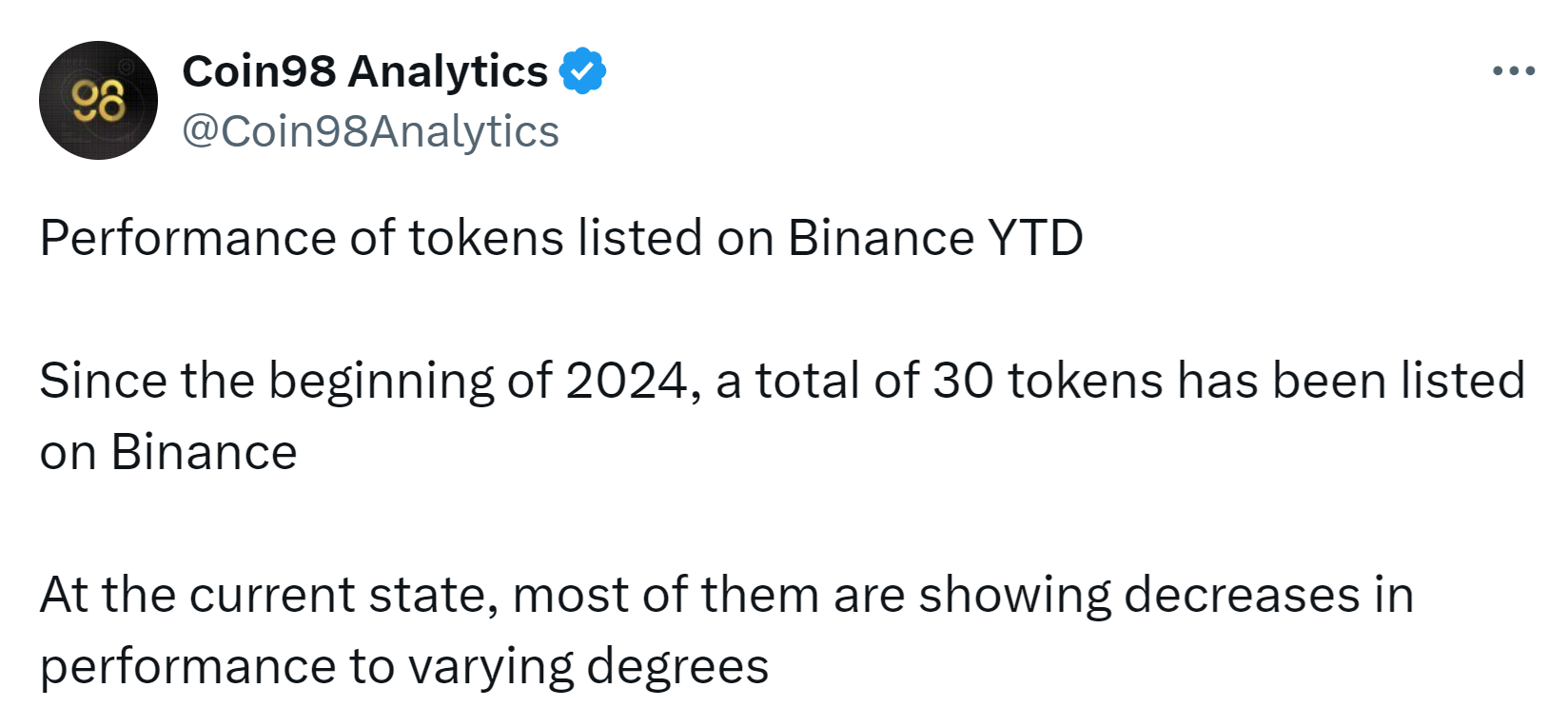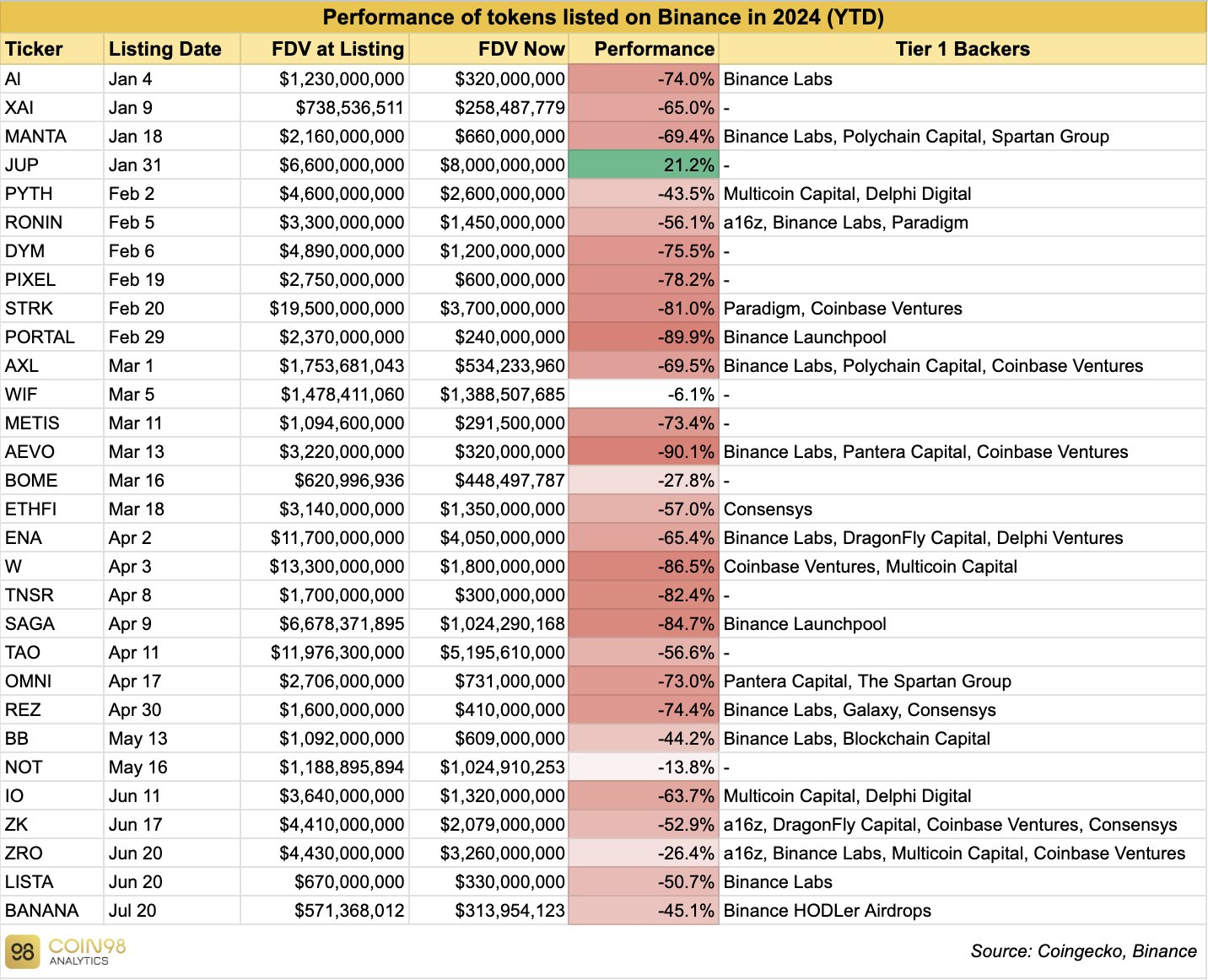2024-08-08

The report from Coin98 highlights a downturn in the performance of cryptocurrencies listed by Binance in 2024.


Of the 30 tokens listed by Binance in
2024, 29 tokens have seen a decrease in
value. This trend reflects the challenges many new tokens face after their
initial listing.
The only exception is Jupiter (JUP),
interestingly, Jupiter’s token (JUP) is the only one among the 30 newly listed
tokens that has gained, showing an increase of 21.2%. This stands out as an
exception in a market where most tokens are struggling.
The situation also brings attention to
the issues with airdrop models, which have been a common strategy for new
tokens to gain initial traction and distribution among potential users.
A large number of tokens airdrop in
2024 is making cryptocurrency market oversupply but the new users coming into
the crypto market to absorb these new tokens is lower than expected.
Jupiter is the only exception
Jup.ag is a decentralized finance (DeFi) platform that acts as an aggregator for the Solana blockchain. It provides users with a way to find the best prices for token swaps by routing their trades through various decentralized exchanges (DEXs) to optimize for the lowest slippage and best rates.
Jup.ag supports a wide range of tokens
available on the Solana network, making it easier for users to trade tokens
efficiently and effectively. The platform aims to enhance liquidity and improve
trading experiences by leveraging multiple liquidity sources within the Solana
ecosystem. Jupiter vs Uniswap?
Jupiter’s TVL
$621 million.
JUP token valuation
Market Cap: $1.141 billion
Fully Diluted Market Cap: $8.459 billion
Ranking: 56th largest crypto by market cap
Jupiter vs. Uniswap differences
Jupiter (Jup.ag) and Uniswap are both
decentralized exchanges (DEXs) that facilitate the trading of cryptocurrencies,
but they operate on different blockchains and have some distinct features.
Blockchain
Jupiter operates on the Solana blockchain, known for its high speed and low transaction costs.
Uniswap operates on the
Ethereum blockchain, which is widely used but can suffer from high gas fees and
slower transaction times. Uniswap is also available on other blockchains as
well.
Functionality
Jupiter acts as an
aggregator, finding the best prices across various DEXs on the Solana network.
It routes trades through the most efficient paths to optimize for the best
rates and lowest slippage.
Uniswap is a standalone
DEX that provides liquidity pools for trading directly on the Ethereum network.
It uses an automated market maker (AMM) model, where users can trade directly
against liquidity pools.
Fees
Jupiter benefits from Solana’s
low transaction fees, making it cost-effective for traders.
Uniswap’s transaction fees can be high for
Ethereum blockchain, which can vary significantly depending on network
congestion. But on other blockchain networks are cheap.
Liquidity
Jupiter aggregates
liquidity from multiple DEXs on Solana, potentially offering deeper liquidity
and better trade execution.
Uniswap’s liquidity is provided by users directly to Uniswap’s pools. Liquidity can be extensive but might be fragmented across different pairs.
User Experience
Jupiter aims at
providing an optimized trading experience by aggregating liquidity and finding
the best trade routes on Solana. It can be more complex due to the aggregation
of multiple DEXs.
Uniswap is simple and user-friendly
interface, making it easy for users to swap tokens directly from their wallets.
However, users might face higher costs due to gas fees.